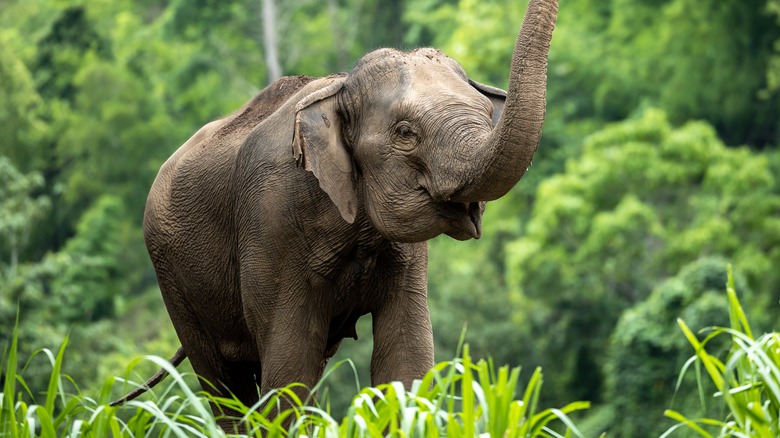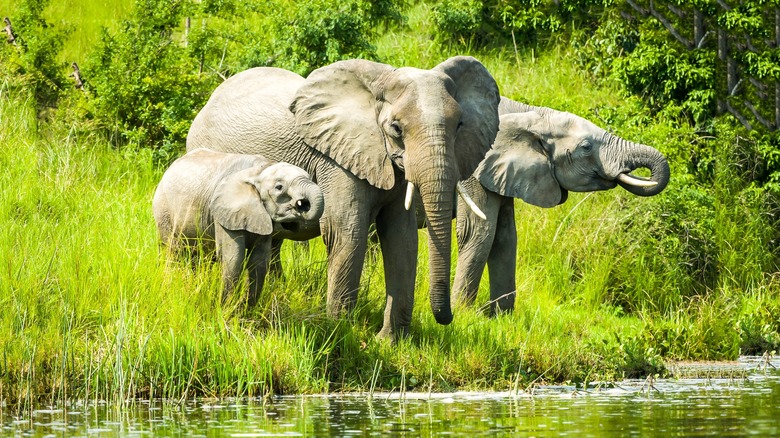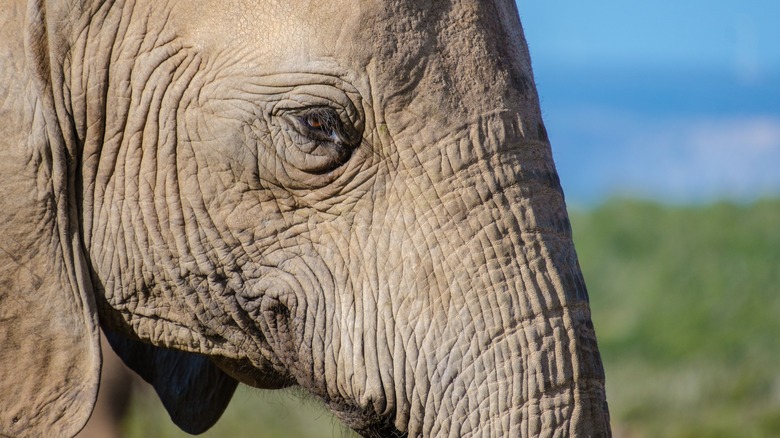How An Elephant's Health Is Negatively Impacted By Human Riders
There are more fascinating, unusual, and downright bizarre species on Earth than it's possible to even imagine. A May 2016 study from Indiana University titled "Earth may be home to one trillion species" (via Science Daily) suggests ... well, exactly that. Science, according to the research, has discovered, classified, and identified only about one-thousandth of a percent of them.
As such, it's impossible to say how many remarkable creatures may dwell on this planet, outside of the scope of our experience (at least for now). We continue to expand our horizons in that regard, but we also have close relationships with numerous species that we have identified.
Of those, elephants are among the most iconic and revered. African elephants — vast, magnificent creatures that they are — are the largest land dwellers on Earth, per National Geographic. It's a long-held wish for many to ride an elephant, but many tourists are unaware of the ill-effects this can cause.
The best-known attribute of elephants, beyond their formidable size, is their intelligence. Per The Nature Institute, "intelligent behavior allows the animal to deal with a concrete situation in a flexible and non-schematic manner." They can solve problems, and even seem to mourn their dead.
Incredible elephants
The BBC Earth crew (via BBC Earth on YouTube) once encountered an elephant the show's narrator stated was "behaving rather oddly ... he's curling his trunk up against his cheek ... it's a sure sign of stress." Why was the elephant stressed? It was mourning its dead fellow, that's why. "The male pays his respect and moves on," the narrator continues, marveling at how emotionally intelligent these animals are.
With their great strength and resilience, elephants have historically been used in warfare and for other purposes. From carrying loads to digesting beans for the priciest coffee in the world (it's called Black Ivory Coffee, costs $1,100 for a kilogram and the beans have made their way through elephants' digestive systems, per the Huffington Post), we have long been employing elephants to suit our needs
Riding atop them has had various practical and tourist bucket list purposes, but this practice can be very harmful for the animal. The biology of an elephant just isn't designed to support us for a ride.
Animals Asia reports that the breeding of captive elephants is rarely successful. To remove that obstacle, the elephants that are ridden by tourists are often simply and callously captured wild. According to the foundation, elephants are then subjected to awful physical abuse to make them compliant. For majestic and compassionate animals such as these, the physical and mental harm inflicted must surely be devastating.
Why putting things on elephants' backs can be harmful to them
Fortunately, organizations such as Elephant Aid International work to raise awareness of elephants' plight and support them around the world. The founder, president and CEO of Elephant Aid International is one Carol Buckley. In a Facebook post in 2014, Buckley shared an image of an elephant's striking skeleton, explaining in great depth why their spines, in particular, mean that carrying riders and loads can be awful for them.
"Instead of smooth, round spinal disks, elephants have sharp bony protrusions that extend upwards from their spine," Buckley writes. These are surrounded and reinforced by flesh, and bearing heavy weights on the tops of their backs compresses them. Elephants, Buckley goes on, "have evolved to support a mass amount of weight suspended below their spine."
Humans, in short, are forcing an elephant's body to do precisely the opposite of this, and this can have both short- and long-term implications. Combined with the cruelty captive elephants can be subjected to (they can be kept in chains, denied the chance to bathe themselves, and made to carry people around all day in the heat, per Animals Asia), it's clear that elephant welfare is a crucial issue.


